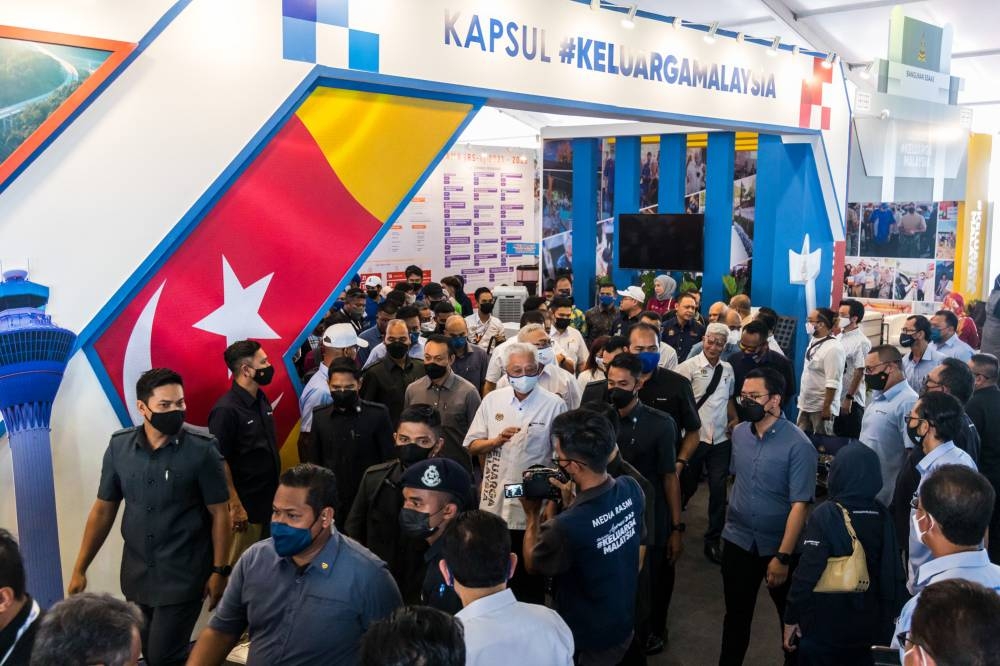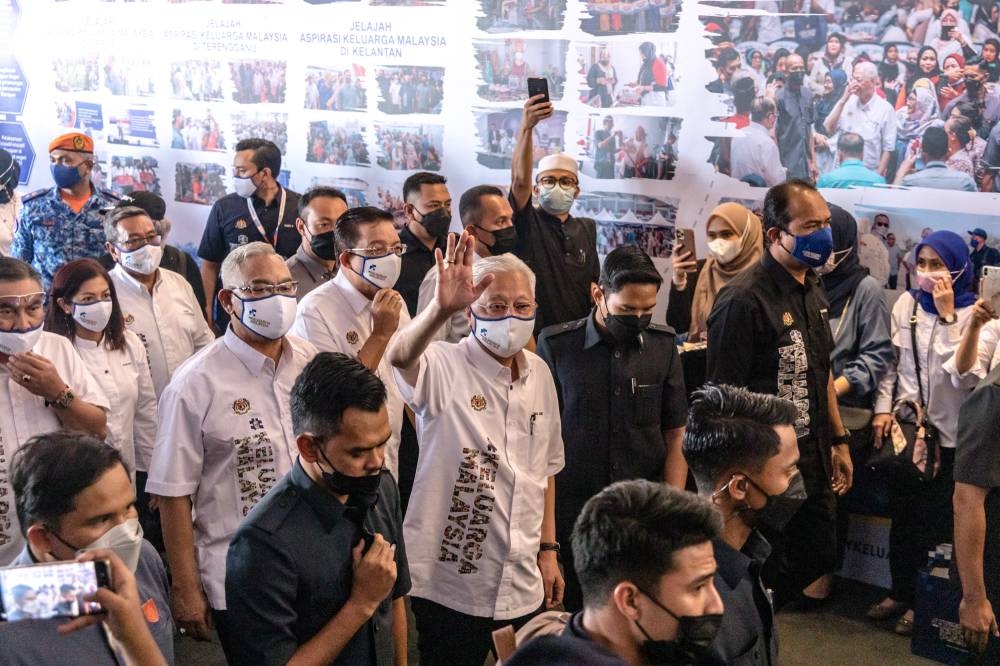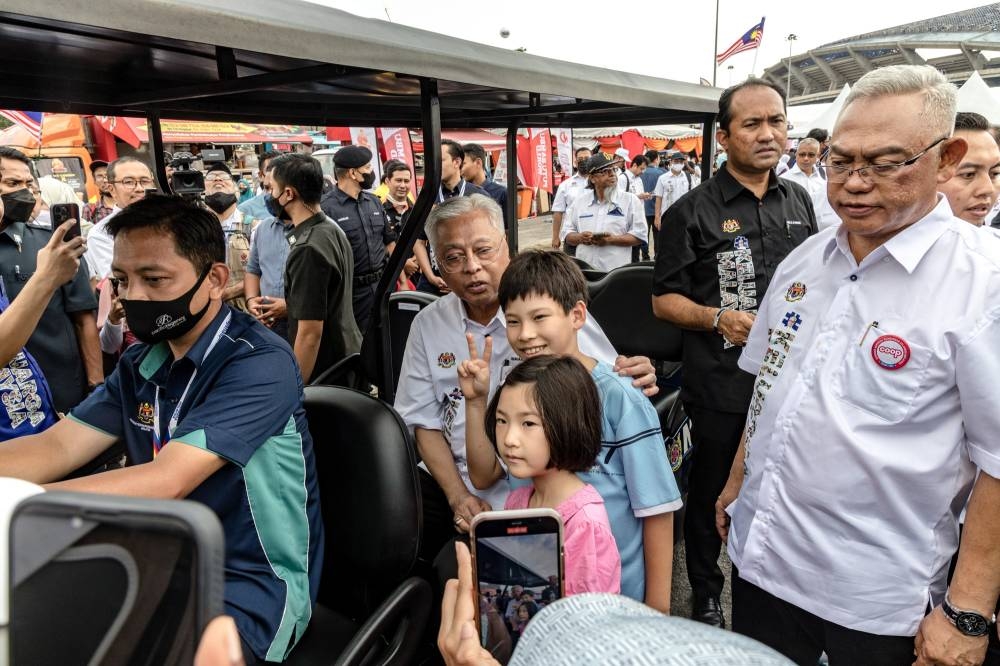KUALA LUMPUR, Aug 20 — Datuk Seri Ismail Sabri Yaakob was an unexpected choice to succeed Tan Sri Muhyiddin Yassin, but political observers believe his appointment as Malaysia’s ninth prime minister last year is keeping the nation moving forward through economic and political crises both at home and globally.
As the first prime minister not to be the head of a political party, analysts contacted by Malay Mail said the Umno vice-president has so far managed to resist pressure from his own party to hold early national elections and even introduce certain key institutional reforms through a deal with the federal Opposition for the sake of government stability.
“That’s the good thing about him, he is kind of a stabiliser in terms of the head-on between Bersatu-Umno or Tan Sri Muhyiddin Yassin and the government,” said Azmi Hassan, a senior fellow at the Nusantara Academy for Strategic Research.
“He’s the chosen prime minister because he was accepted by all, be it PN, BN or the Opposition,” he added, referring to the Bersatu-led Perikatan Nasional and Umno-led Barisan Nasional coalitions that have joint control of government.
Azmi said that the Memorandum of Understanding for Transformation and Political Stability with Pakatan Harapan was signed at all last September could be attributed to Ismail Sabri heading the government, even as he remarked that the unprecedented truce has not been smooth.
He also noted that under Ismail Sabri’s leadership, Malaysia has been able to keep inflation levels in check while still maintaining subsidies for fuel, compared to other nations that are struggling with rising energy costs.
“Ismail shows his caring side especially for those in need by increasing the Bantuan Keluarga Malaysia aid and keeping the cooking oil and petrol subsidies around when other governments are not,” he added.

Bantuan Keluarga Malaysia, better known as BKM locally, is the direct cash aid initiative under Ismail Sabri’s “Keluarga Malaysia” concept targeted to benefit Malaysian wage earners in the bottom 40 percentile.
Announced during the tabling of Budget 2022 in Parliament last year, the first payment was disbursed on March 28 this year, with a second round ordered when chicken and egg prices — controlled goods — shot up above the government-set ceiling for retail.
Universiti Kebangsaan Malaysia political analyst Kartini Aboo Talib commended Ismail Sabri for enlarging his “Keluarga Malaysia” concept to “Keluarga Global” as instrumental for political stability within Asean during the Covid-19 era.
She added that Malaysia has also earned praise from the World Health Organisation for its 99 per cent Covid-19 vaccination rate
“In addition, he led Malaysia on the Asia-Pacific Economic Cooperation 2021 and committed to ensuring Malaysia would be a resilient state post-health crisis. He is managing inflation with all the support from experts, which has helped the country control inflation at 2.48 per cent compared to the consumer prices in the USA, which is up to 9.1 per cent, the most significant increase in 40 years,” she said.
However, she observed that despite the general acceptance among politicians of Ismail Sabri as PM, he has not been spared from criticism.
“Ironically, the criticism has not been fair to him. His targeted subsidies were condemned, yet that would be workable in helping the needy and the state to control the limited budget as managing the state and its budgets and the people is challenging in itself,” Kartini told Malay Mail.

Incidental nation-builder
Universiti Sains Malaysia’s political scientist Ahmad Fauzi Abdul Hamid said that Ismail Sabri’s ability to weather the storm shaking Malaysia’s political stability might have helped the 62-year-old increase his support among Malaysians.
“In a rather peculiar way, it can be argued that Ismail Sabri’s most notable contribution to nation-building would be his firm stance in not interfering in the judicial process that was going on against his former and present boss in Umno, withstanding pressures to do so from feudalistic elements within the party,” he said, referring to Datuk Seri Najib Razak and Datuk Seri Ahmad Zahid Hamidi respectively.
Both Najib and Ahmad Zahid have been dubbed the heads of the “court cluster”, a euphemism for Umno politicians with charges of corruption and other power abuses hanging heavy over their heads.
“Ismail’s attitude has won admiration from silent observers and younger members of Umno who are aware that Umno couldn’t undergo reform so long as they keep on showing loyalty to their disgraced leaders over the rule of law,” Ahmad Fauzi said.
“Having someone like Ismail Sabri who obdurately refuses to kowtow to the so-called ‘court cluster’ gives them and Umno some hope for the future,” he added.
Oh Ei Sun, a senior fellow at the Singapore Institute of International Affairs, shared a similar view.
“Perhaps the biggest contribution is his inaction, which for example enables the judiciary to be more independent and we should congratulate him for the political will in seeing through the passage of the anti-hopping law,” Oh told Malay Mail.

He lauded the Ismail Sabri government for showing its political steel in tabling the Anti-Party Hopping Bill, which sailed through the Dewan Rakyat last month to prevent elected lawmakers from switching their political allegiances as they pleased, thereby threatening government stability — as has been seen with the collapse of the Pakatan Harapan coalition just 22 months after it won Election 2018, and the successive ouster of the Muhyiddin administration that replaced it 18 months later.
But Oh said Ismail Sabri should be careful not to let his desire to promote the Bumiputera agenda or Bahasa Melayu as a lingua franca spiral out of control.
“His situation can be further improved if he stopped pandering to the racialist crowds with the Bumi Mall or ‘Use Malay Only” programmes. It obviously did not work as Malays are still supporting Najib, who incidentally speaks perfect English,” he said.
Shazwan Mustafa Kamal, an associate director with Vriens & Partners — a public policy, government affairs and political risk consultancy — said Ismail Sabri’s biggest contribution in his first year as PM was showing he has political will to push through institutional and health reforms.
“He knew he needed bipartisan support to pass through the annual Budget, and that support lay with key reforms that needed to be addressed.
“He showed political will in pushing them through, as evidenced by the last parliamentary sitting. If he sticks to delaying elections until the passage of the Generational End Game, the political financing Bill and term limits for the prime minister’s position, this sets him up for a second term in office,” he said.
The idea to limit the prime minister to two terms, or roughly 10 years, was among the conditions agreed upon in the government cooperation deal signed last year while Ismail Sabri has been keen to introduce a law to regulate how politicians fund their campaigns.
“He has already shown a willingness to collaborate with the Opposition in matters of policy making and elevating the role of Parliament and Special Select Committees,” Shazwan said.
To commemorate Ismail Sabri’s “Keluarga Malaysia” initiative and his one year in office, the Jelajah Aspirasi Keluarga Malaysia carnival is being held at the Shah Alam stadium in Selangor which started yesterday and will continue till tomorrow from 9am to 9pm.






















